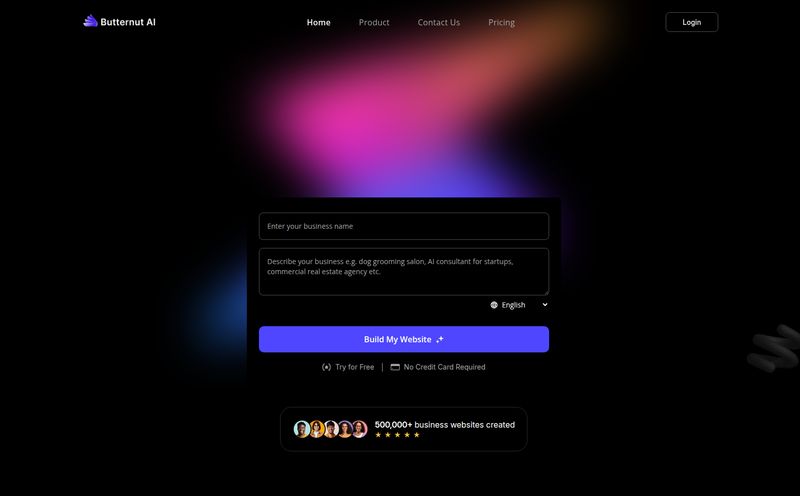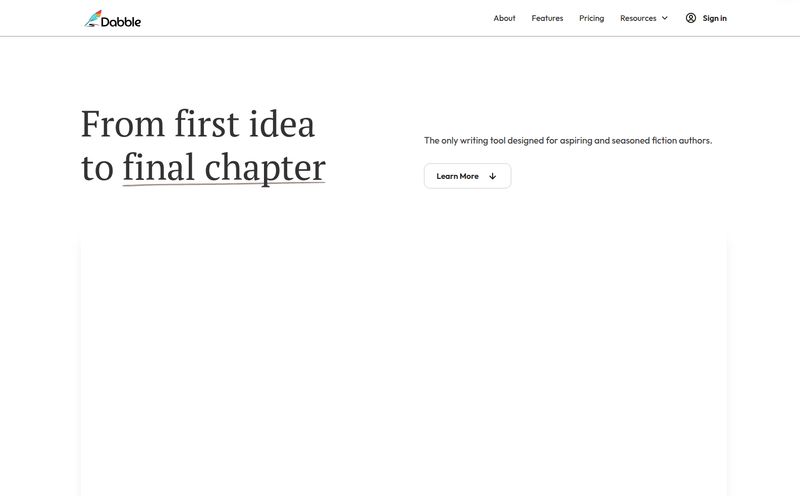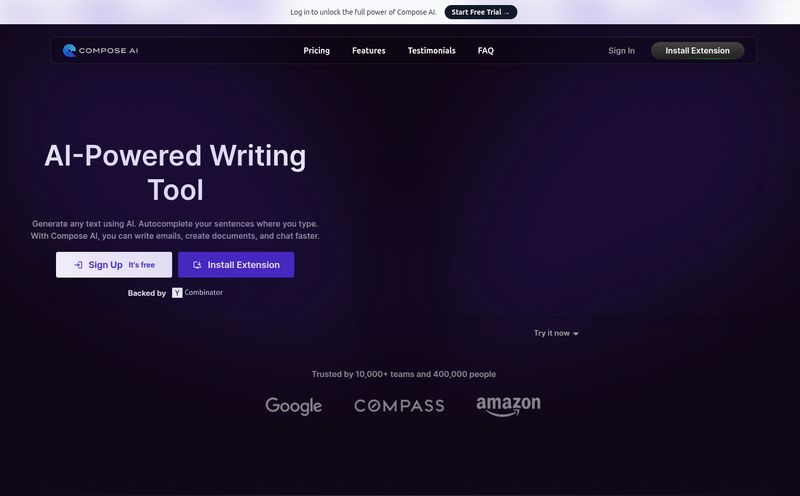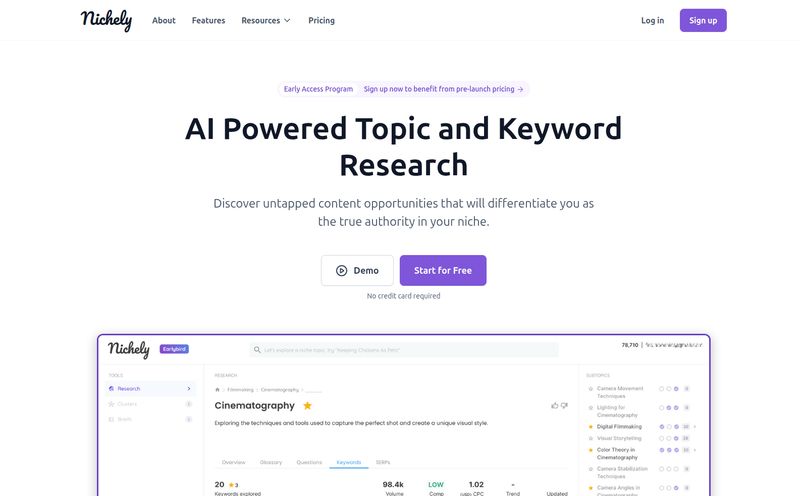We’ve all been there. The cursor blinks. Taunting you. You have a deadline, a content calendar to fill, or just that burning desire to get a post out. But your brain? Nothing. Tumbleweeds. Just the low hum of your computer and the crushing weight of a blank page. For years, my process for this involved three more cups of coffee, pacing around my office, and maybe scrolling through competitor blogs for a spark. It’s… not efficient.
Then I stumbled across this little web app: the Article Idea Generator. Another AI tool, I thought. Great. The internet is swimming in them. But something about its dead-simple interface and the little “Star on GitHub” link made me pause. This wasn't some slick, venture-backed platform with a million features and a hefty subscription. It felt different. So, I gave it a shot.
So What Is This Thing, Exactly?
At its heart, the Article Idea Generator is exactly what it says on the tin. It's an open-source tool that uses AI to spit out article ideas. You type a topic or a keyword into the box—the one that says “What’s on your mind?”—and it gives you a list of potential blog post titles and angles. Simple as that. No sign-up, no credit card, no seven-day trial that you’ll forget to cancel.
Being open-source is a big deal to me. It means the code is public (you can check it out on GitHub), and it’s usually built by a community of developers for the sake of, well, building something cool and useful. It often means no hidden agendas. No selling your data. Just a tool for the people. A refreshing change, isnt it?
My First Spin and That Curious Little Checkbox
Alright, time to take it for a spin. For my first test, I typed in a broad topic I know well: “organic traffic growth.” I left the little checkbox unchecked for now. I hit the purple arrow.

Visit Article Idea Generator
The results were… pretty solid, actually. Things like:
10 Underutilized Methods for Boosting Organic Traffic
The Complete Guide to On-Page SEO for Beginners
How We Increased Our Organic Traffic by 150% in 6 Months: A Case Study
Not bad. A bit generic, maybe, but they're perfect starting points. They’re the kind of foundational ideas you can build a whole content strategy around. But then my eyes drifted down to that little checkbox: “Enable SEO & Clickbait Feature.” Oh, this is where the fun begins.
I ticked the box and ran the same search. The vibe shifted. Dramatically.
Stop Doing This! The #1 Mistake Killing Your Organic Traffic
These SEO Secrets Are What Google Doesn't Want You to Know
I Used This One Weird Trick and My Website Traffic Exploded Overnight
You see the difference, right? It’s the SEO equivalent of putting on a flashy jacket and sunglasses. It’s louder, more provocative. And you know what? It works. As much as we SEO purists sometimes hate to admit it, a well-crafted, curiosity-driven headline gets the click. This feature is like a direct line to understanding what makes people’s cursors move.
The Good, The Not-So-Good, and the AI of It All
After playing with it for a good hour, I got a real feel for its strengths and weaknesses. On one hand, this tool is a fantastic creative sparring partner. It’s brilliant for those moments when your own well of ideas has run dry. It’s fast, incredibly easy to use and it genuinely helps break through that initial inertia. And the best part? Its free. That can't be beaten.
However, let's be real. It's not a magic bullet that writes your content for you. The quality of the ideas it spits out is directly tied to two things: the quality of your input and the limits of the AI model behind it. Some of the suggestions are pure gold. Others... are a bit nonsensical or need a lot of massaging to become workable. You still need your human brain, your expertise, and your unique voice to take these AI-generated seeds and grow them into a proper article. The AI gives you the marble, but you still have to be the sculptor.
Wait, It's Really Free? What's the Catch?
In this economy? We're all conditioned to look for the catch. I did too. I went looking for the pricing page, a sneaky subscription model, something. I clicked around and… found a 404 error. This page could not be found. You can’t make this stuff up. The pricing page doesn't exist because there is no price.
"I went looking for the pricing page, and... well, it's not there. Literally a 404 error. The best kind of pricing is no pricing at all."
This goes back to its open-source nature. It's a project, not a product in the traditional sense. It exists to solve a problem—writer’s block—and that's it. No upsells, no premium tiers. Just a clean, functional tool for anyone to use. For those of us who have been in the marketing game for a while, that kind of straightforward utility is just chef's kiss.
So, Who Is This Tool For?
I can see a few groups of people getting a ton of value out of this.
If you're a new blogger or just starting in content marketing, this thing is a godsend. It can help you brainstorm your first few months of content in an afternoon, giving you a clear roadmap and helping you find your footing. It's a great way to see what popular angles look like.
For us seasoned SEOs and content managers, it's a bit different. We might not need help with basic ideas, but it's an incredible tool for breaking out of a rut. When you've written about the same pillar topic for the tenth time, this generator can give you that one weird, left-field angle you hadn't considered. It’s a quick-and-dirty way to inject some novelty into a stale content calendar.
Even students or anyone needing to write an essay could use this to kickstart their research process. Type in “The fall of the Roman Empire” and see what kind of questions and angles it proposes. It’s a brainstorming machine for everyone.
Frequently Asked Questions
Is the Article Idea Generator truly free to use?
Yes, 100%. It’s an open-source project. There are no fees, subscriptions, or hidden costs. The non-existent pricing page is proof enough!
Do I need to be a tech whiz to use it?
Absolutely not. If you can type into a search bar, you can use this tool. The interface is about as simple as it gets.
Are the generated ideas completely unique?
The ideas are generated by an AI, so while they can be unique, they are based on patterns from vast amounts of text data. It's always best practice to take a generated idea and infuse it with your own research, perspective, and voice to make it truly one-of-a-kind.
What's the real difference between the 'SEO' and 'Clickbait' options?
Think of it like this: The 'SEO' option focuses on creating titles with clear keywords and user intent, designed to rank well in search engines. The 'Clickbait' option (a term used loosely here) focuses on creating high-curiosity headlines designed to maximize click-through rates on social media or in emails. Both are useful for different channels.
Can it generate ideas for very niche topics?
Yes, but your results may vary. For super-niche topics, you might need to try a few different phrasings for your input. The more specific you are, the more targeted the ideas will be, but it might also produce some strange results. Experimentation is your friend here.
My Final Take on This Little AI Gem
Look, the Article Idea Generator isn't going to revolutionize the entire SEO industry. It's not going to write an award-winning post for you while you sip a margarita on the beach. But that's not its purpose.
It’s a simple, elegant, and powerfully effective solution to a very common and very frustrating problem. It removes the friction of starting. It gets the creative gears turning. For a free tool with no strings attached, the value it provides is kind of insane. It has earned a permanent spot in my pre-writing toolkit.
So next time you're facing that blinking cursor of doom, give it a try. The worst that can happen is you get a few weird ideas and a good laugh. The best? You might just find your next viral hit.
Reference and Sources
- Article Idea Generator Tool (Note: This is a placeholder URL as the actual URL was not provided)
- The tool's source code can be found on GitHub.
- Learn more about the principles of open-source software at the Open Source Initiative.



